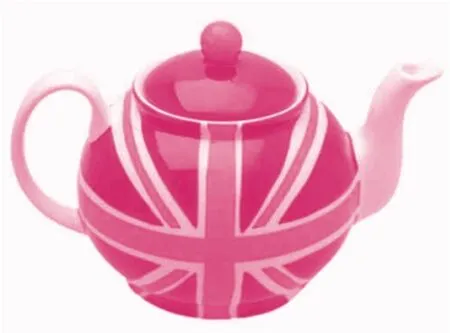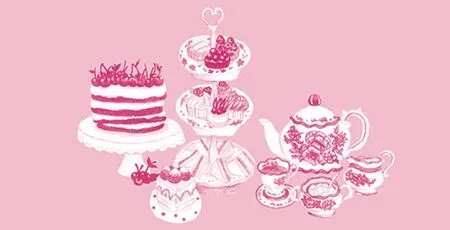英人嗜茶为哪般?
2017-11-17韦罗妮克格林伍德王锡
文/韦罗妮克·格林伍德 译/王锡
英人嗜茶为哪般?
文/韦罗妮克·格林伍德 译/王锡
The British drink more than 60 billion cups of tea a year—so what is it about this humble brew1brew(茶)一次的冲泡量。that refreshes them so?

Whether they take their tea with milk, sugar, lemon or just plain,it’s clear that the British have a fondness for its fl avour. There’s something about that fi rm bitterness that sparks devotion:the British consume 60 billion cups per year, according to the Tea and Infusions Organisation. That’s more than 900 cups a year for every man, woman and child in Great Britain—though we no doubt all know someone who likes many more than that.
[2] Tea has become entrenched2entrench (sth)使处于牢固地位。in the British way of life, from the humble tea break to the afternoon tea to be enjoyed—in a jacket and tie, of course,gentlemen—at the very swankiest3swanky摆阔的;时髦且豪华的。of London hotels.
[3] But what are the molecules behind the taste of this beloved beverage?And does how you take your tea say something about who you are?
[4] To answer that, it’s worth first trying to work out what it is exactly that makes tea taste the way it does. Tea’s flavour is intimately4intimately密切地。affected by how it is grown, processed, and brewed—beginning with the light. Tea bushes—Latin name camellia sinesis—are grown in terraces55 terrace梯田。all over the tropics and subtropics. But if the intent is to make certain kinds of green tea from them,like matcha6matcha抹茶。, growers will make sure they are carefully shaded with nets or mats. Less sun causes them to produce more chlorophyll7chlorophyll叶绿素。as well as fewer polyphenols8polyphenol多酚。, a class of molecules that imparts tea’s singular astringency99 astringency涩味。.
[5] Of course, some of us may like that taste, and tea processing can amp it up10amp up增强,放大。. After the new leaves and buds have been plucked from a bush, they are laid out to dry. How long they lie again depends on the kind of tea intended.For green teas, the leaves are almost immediately tossed in a hot pan or steamed (tea might look like the rawest of edibles111 edible可食物;食用品。, but it is actually cooked,or at least heat-treated). An oolong results when the leaves are dried a little,bruised12bruise捣烂,研碎。and only then cooked. And a black tea—the most popular variant,accounting for 78% of the tea drunk world-wide—results when the bruised leaves dry quite a long while before being fi nished in the pan.
[6] What’s behind all this is that as the tea leaves are drying, enzymes13enzyme酵素。native to the tea plant are busily transforming simple molecules into more complex ones. The longer the tea spends drying,the longer those enzymes have to work—and the more these molecules build up in the tea leaves. The most famous in tea-chemistry circles is probably theaflavin14theaflavin茶黄素。, a tangle15tangle缠结的一团。of carbon rings responsible for some of the ruddy colour of black teas as well as some of the astringency.
[7] Firing the tea leaves calls the process to a halt by destroying the enzymes. As a result, there’s very little thea fl avin and related molecules in, say,green teas. But aside from polyphenols,hundreds of other compounds build up in the tea over time; their roles in crafting tea’s bouquet16bouquet气味;芳香。and taste are not yet clear. Regardless, the end result is a different chemical pro fi le for each kind of tea.
[8] Brewed tea has roughly half thecaffeine of an equivalent volume of coffee, but it is still plenty for a midafternoon pick-me-up17pick-me-up提神物品,兴奋剂(尤指药物或酒精饮料)。. You might have heard that caffeine in tea gives a different high18high兴奋感。from the caffeine in coffee. Many studies have found that if this is the case, it’s because of an amino acid called theanine19theanine茶氨酸。, which occurs in tea. When volunteers consume both caffeine and theanine—versus caffeine and other tea molecules—they show moderately more alertness and better ability to switch between tasks than with caffeine alone. The amount in a given cuppa20cuppa〈英口〉一杯茶。may not be the same as the doses given during a study,however, and the effect of theanine is not enormous. But all on its own, the caffeine will give you a nice lift21lift情绪高昂;精神振奋。.
[9] So that’s what makes tea taste how it does. But why do these melanges22melange混合物。of molecules mean so much to British people? And what does your preference,in terms of tea type and how you drink it, mean about you?
[10] Anthropologist Kate Fox writes in her bookWatching the Englishthat there are several clear messages sent whenever a Brit makes a cuppa.She observes that the strongest brews of black tea are typically drunk by the working class. The brew gets progressively weaker as one goes up the social ladder.
[11] Milk and sweetener have their own codes. “Taking sugar in your tea is regarded by many as an infallible23infallible确实可靠的,绝对无疑的。lower-class indicator: even one spoonful is a bit suspect (unless you were born before about 1955); more than one and you are lower-middle at best; more than two and you are definitely working class,” she writes. Other rules involve when and how milk is added, if any.Making a point of24make a point of强调,特别注意。drinking smoky Lapsang Souchong25正山小种红茶,原产于福建省武夷山市。with no sugar or milk can be a sign of class anxiety in the middle class, Fox suggests: it’s as far as possible as one can get from sweet, strong, milky mugs of the nononsense266 no-nonsense简单直接的;实际的。“builder’s tea”.
[12] There are historical reasons aplenty for why tea came to wash up on Britain’s shores. And one could come up with any number of rationales for why the current state of affairs was inevitable (boiling water to make tea,for instance, made it less likely to give you a stomach bug).
[13] A food scientist I once corresponded with pointed out something that seems to apply here. “In my opinion,food choices are driven by one’s environment—the context,” he wrote. A food or drink’s real importance in your life may be because of everything that surrounds it—the culture of it.
[14] Fox observes that in truth,alongside its chemical properties, tea is an infallible social space-filler27space-filler填充材料。.She writes, “Tea-making is the perfect displacement activity28displacement activity〈心理〉替代性活动;转移行为。: whenever the English feel awkward or uncomfortable in a social situation (that is, almost all the time), they make tea.”
[15] It’s also interesting to note that some of the molecules involved in the flavour of teas likely evolved as defenses against being eaten by birds,insects and other creatures. That is somewhat ironic, given how vigorously we humans seek it out—and how many social meanings we’ve attached to it. ■
每年,英国人都要喝掉600多亿杯茶。是什么让这种司空见惯的饮品如此提神振气呢?
不论他们喝茶时是加牛奶、糖、柠檬,还是什么都不加,英国人显然对茶情有独钟。萦绕在唇齿之间的这种苦涩茶味让人欲罢不能:据英国茶叶与熬煮协会的估计,英国人每年都要喝掉600亿杯茶。也就是说不管男女老少,平均下来大不列颠的每个人每年都要喝掉900杯茶;当然喝得比这个量多得多的也不乏其人。
[2]茶已然根植于英式生活方式之中:从常见的茶歇时间到见于伦敦最为奢华的宾馆、需要悠然消享的下午茶——绅士们,这时当然得着短上衣,系上领带。
[3]人人爱茶,然而茶之味源自何种化合物?一个人喝茶的方式是否也多少透露出他的个性呢?
[4]要回答这些问题,我们可以先尝试弄明白到底是什么让茶有这般的风味。茶的味道与它的生长、加工和沏制的过程紧密相关,始之于光照。茶树(拉丁学名camellia sinesis)遍布于热带、亚热带的梯田,然而倘茶农想制作某种绿茶(比如抹茶),必须得悉心使用网子或席子为茶树遮阳。减少光照会使茶叶的叶绿素增多,多酚(一类赋予茶叶其独特涩味的分子)减少。
[5]当然了,有些人可能就是喜欢茶的苦涩味,而茶叶加工过程可以加重这种涩味。茶叶、茶芽从茶树上采摘下来后会被铺开脱水;至于这一过程要持续多长时间,取决于要制作哪种茶。制作绿茶的时候,鲜叶几乎是立即被抛入热锅翻炒或是蒸制。(在各种食品中,茶虽看似颇为纯天然,但其实也是经过炒制而成,起码是经过热处理的。)将茶叶略加脱水,捻糅,然后才烹制,便制成了乌龙茶。而红茶(最受欢迎的种类,全世界喝掉的茶中78%都是红茶)是将糅制后的茶叶长时间脱水,然后在锅中翻炒而成的。
[6]这背后的奥妙即是:当茶叶脱水时,茶树自身含有的酶会马不停蹄地将简单分子转化为复杂分子。茶叶脱水过程越长,酶的作用就发挥得越久,复杂分子也就积聚得越多。在茶叶化学界最有名的恐怕得数茶黄素了;这是一种复杂的碳环,它部分地导致了红茶的苦涩味,也是为其带来红润色泽的因素之一。
[7]加热茶叶的时候会破坏酶,从而终止上述转化。结果便是在诸如绿茶这样的茶叶品种中,茶黄素及其相关分子的含量就很少了。但是,除了多酚之外,数以百计的其他化合物也逐渐在茶中累积;它们在茶叶的芬芳气味和口感中扮演了什么角色目前尚不清楚。无论如何,其结果便是每一种茶都有不同的化学结构。
[8]沏制茶中所含咖啡因 大约是等量咖啡的一半,而这对缓解下午三点多钟的无精打采状态来说已经是绰绰有余了。你可能已经听说过,茶叶中的咖啡因和咖啡中的咖啡因对人的刺激作用不同。许多研究表明,如果这种说法属实,这是由于茶中含有一种叫做茶氨酸的氨基酸。同时服用咖啡因和茶氨酸(区别于咖啡因与其他种类的茶分子)的参与试验者表现更机敏,在不同任务之间转换的能力也比只服用咖啡因时有所提高。不过一杯茶中所含的咖啡因与研究中所给的剂量可能并不一样,而茶氨酸的效用也并不很大。然而光靠茶中含有的咖啡因就足够让你精神抖擞一会儿了。

[9]这就是茶之味的奥妙所在。但是为什么这些分子的混合物对英国人意义非凡呢?而人对茶叶种类和饮茶方式的偏好又透露出饮茶人的什么信息呢?
[10]人类学家凯特·福克斯在其著作《英国人面面观》中写到,无论何时,英国人泡茶的举动都会传达出一些清晰的信息。她注意到,工人阶级一般都喝味道最浓烈的红茶。一个人的社会地位越高,喝的茶也就越淡。
[11]牛奶和甜味剂也有其特殊含义。福克斯写道:“许多人认为在茶中放糖绝对是下层阶级的表现:除非你出生于大约1955年以前,否则即使加一勺糖也会让人对你的身份存疑;多过一勺,你便顶多算下级中产阶级;超过两勺你便是板上钉钉的工人阶级了。”其他的规则包括该什么时候加牛奶(如果选择加的话)和加多少。她说,讲究喝富含烟熏味的正山小种红茶且不加糖或牛奶,可能透露了中产阶级的阶级身份焦虑:这和加糖加奶、茶味浓郁、简单朴实的“建筑工之茶”相比,可谓天差地别。
[12]英国人为什么会大量进口茶叶,有很多历史原因。英国人爱茶为何势所必然,人们也可以想出许多原因(比方说,用沸水煮茶和可以降低患胃病的风险)。
[13]一位和我有过通信往来的食品科学家说过的一些话在这里也适用。他写道:“在我看来,人们如何选择食物是由环境——即生活背景驱动的。”一种食品或饮料在生活中真正有多重要,可能在于其周遭的一切,即其文化。
[14]福克斯评论道,事实上,除了其化学功用外,茶也是可靠的社交活动填充剂。福克斯写道:“泡茶是一种完美的替换活动。每当英国人在某种社交场合中感到别扭或不舒服时(他们几乎一向如此),他们便要沏茶。”
[15]有个有趣的事实也值得一提:一些使茶产生苦涩味道的分子可能是茶树为了防止被鸟类、昆虫以及其他生物吃掉而进化而来的。想想我们如此积极地探求茶味背后的原因,还附上了很多社会内涵,这多少有些讽刺。 □
Why Do the British Love the Taste of Tea So Much?
ByVeronique Greenwood
(译者曾获第五届“《英语世界》杯”翻译大赛二等奖)
